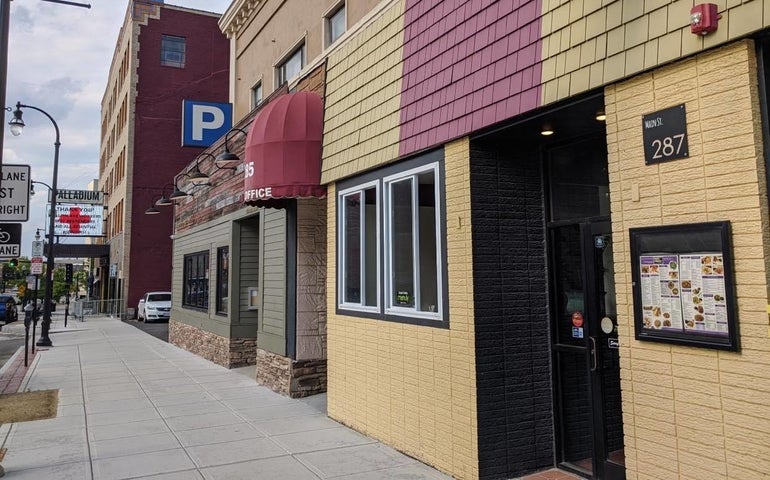Small businesses hit hard by the government’s economic shutdown, particularly restaurants and lodgings, will now have until May 2021 to pay some state taxes from March 2020 through April 2021, Gov. Charlie Baker and legislative leaders announced Tuesday evening.
Through emergency regulations to be issued by the Department of Revenue, state government plans to further delay tax deadlines for small businesses around the state, some of which have not been allowed by the state to reopen since first closing in the spring. Sales, meals and room occupancy taxes for qualifying businesses for March 2020 through April 2021 will not be due to the state until May 2021, and those that wait will not face any penalties or interest. Without the change, those taxes would have been due this month.
“Our Administration is committed to supporting local businesses and Main Street economies recovering from the impact of COVID-19, and we’re glad to work with our legislative colleagues on this additional measure to provide administrative tax relief,” Baker said. “Extending the tax relief measures we put into place earlier this year will help support companies across Massachusetts including small businesses in the restaurant and hospitality industries.”
Any businesses that paid less than $150,000 in regular sales plus meal taxes or less than $150,000 in room occupancy taxes in the year ending Feb. 29 will qualify for relief, according to a press release. Businesses that do not qualify but have meals tax and room occupancy tax obligations will have late-file and late-pay penalties waived, the administration said.
Tax relief is a topic frequently debated over the years in the Legislature but this new round of relief was the latest example of the governor taking unilateral action to address impacts of the pandemic, which has already prompted a wave of restaurant closures with more expected as fall and winter approach.
House Speaker Robert DeLeo and Senate President Karen Spilka were each quoted in the administration’s press release supporting the extension of administrative tax relief measures. DeLeo said the further extension “will provide a clear business pathway, especially to our restaurant and hospitality industries.”
Last year, the House started a working group to find ways to promote the state’s restaurants and culinary culture, but that panel was repurposed as a Restaurant Recovery Commission when the COVID-19 pandemic hit and the government’s mitigation efforts dealt a devastating blow to the restaurant industry.
Earlier this week, Salem Sen. Joan Lovely filed a bill (SD 3047) with the backing of House Assistant Minority Leader Rep. Brad Hill meant to help businesses that are unable to reopen access property tax relief.
The bill specifically seeks to help businesses in Phase 4 of the Baker administration’s reopening plan. Those businesses, which include bars, wedding venues and theaters, are not expected to be allowed to reopen until there is a vaccine or significant breakthrough in COVID-19 treatment, the governor has said.
Any business designated as part of Phase 4 would be allowed to “apply for a real estate tax abatement during any quarter of the fiscal year” under Lovely’s bill and the state would be on the hook to make up the difference in what a city or town receives as a result of an abatement obtained under the bill. The authorization would expire 90 days after the governor’s state of emergency order lapses or is lifted.
“Local companies and hard-working employees form the backbone of every Massachusetts municipality,” Lovely said. “I know every establishment wants to open again, but until we can safely do so I want to help businesses and their workers by giving them badly needed relief on the tax side so that they can hang on until Phase IV begins.”
Peabody Rep. Tom Walsh, who joined Lovely and Hill at a Topsfield wedding venue Monday to unveil Lovely’s bill, said that while many businesses have been creative in finding ways to stay afloat during the pandemic, Phase 4 outfits “don’t even have that opportunity.”
Despite Housing and Economic Development Secretary Mike Kennealy — who co-chairs the state’s reopening advisory board with Lt. Gov. Karyn Polito — having said Phase 4 “is predicated on a medical breakthrough,” Lt. Gov. Karyn Polito has said the administration “would be willing to look at” an exception to allow some fans to attend New England Patriots games at Gillette Stadium this fall.
It is unclear whether the administration would consider similar exceptions for businesses that are less politically connected than one owned by Robert Kraft, who helped Baker secure a key shipment of protective gear from China at the height of the COVID-19 surge this spring. The administration’s phase designations are not static and the governor recently allowed arcades, which had been part of Phase 4, to reopen under specific guidelines as soon as Friday.

